![Man About the House - Complete Box Set [Repackaged]](/pictures/1085342.jpg) Man About the House - Complete Box Set | DVD | (26/05/2008)
from £21.99
| Saving you £10.00 (50.03%)
| RRP
Man About the House - Complete Box Set | DVD | (26/05/2008)
from £21.99
| Saving you £10.00 (50.03%)
| RRP Chrissy and Jo share a bedsit flat at 6 Myddleton Terrace in the Earls Court district of London. The morning after a farewell party for a third (female) flatmate and in sore need of the extra financial contribution they prepare to start looking for her replacement. Unbeknownst to them asleep in the bath after drinking too much of an appalling concoction they called punch is Robin Tripp the friend of a friend of a friend of a friend and a catering student to boot. Since he can cook they invite him to become the third flatmate offering him the spare bedroom and warning him to keep out of theirs.
![Straw Dogs [1971]](/pictures/1019628.jpg) Straw Dogs | DVD | (07/10/2002)
from £14.44
| Saving you £-6.45 (N/A%)
| RRP
Straw Dogs | DVD | (07/10/2002)
from £14.44
| Saving you £-6.45 (N/A%)
| RRP According to critic Pauline Kael Straw Dogs was "the first American film that is a fascist work of art". Sam Peckinpah's only film shot in Britain is adapted from a novel by Gordon M Williams called The Siege of Trencher's Farm which Peckinpah described as a "lousy book with one good action-adventure sequence". The setting is Cornwall, where mild-mannered US academic David Sumner (Dustin Hoffman) has bought a house with his young English wife Amy (Susan George) in the village where she grew up. David is mocked by the locals (one of whom is Amy's ex-boyfriend) and treated with growing contempt by his frustrated wife, but when his house comes under violent siege he finds unexpected reserves of resourcefulness and aggression. The movie, Peckinpah noted, was much influenced by Robert Ardrey's macho-anthropological tract, The Territorial Imperative. Its take on Cornish village life is fairly bizarre--this is a Western in all but name--and many critics balked at the transposition of Peckinpah's trademark blood-and-guts to the supposed peace of the British countryside. A scene where Amy is raped caused particular outrage, not least since it's hinted she consents to it. Not for the first time in Peckinpah's movies there are disquieting elements of misogyny, and it doesn't help that the chemistry between Hoffman and George is non-existent. (Impossible to believe these two would ever have clicked, let alone married.) But taken as a vision of irrational violence irrupting into a civilised way of life Straw Dogs is powerful and unsettling, and the action sequences are executed with all Peckinpah's unfailing flair and venom. Oh, and that title? A quote from Chinese sage Lao-Tze, it seems, "The wise man is ruthless and treats the people as straw dogs." The film was long withheld from home viewing in Britain by nervous censors, but this release presents it complete and uncut. --Philip KempOn the DVD: Straw Dogs is as jam-packed a disc as is possible for a film made before the days of obligatory "making of" features. Both the sound and visuals have transferred well, and, like the script, have aged well. There's a bumbling original interview in the style of Harry Enfield's Mr. Cholmondley-Warner, along with stills and original trailers. The new material includes a feature on the history of the film's censorship and commentaries by Peckinpah's biographers musing over interesting fan-facts (though none of the speakers have any first-hand experience of the making of the film). However, Katy Haber's commentary, and interviews with Susan George and Dan Melnick, offer a much more in-depth and intimate portrayal of the man and the making of the film. --Nikki Disney
![Man About the House [DVD]](/pictures/1148820.jpg) Man About the House | DVD | (28/01/2019)
from £11.98
| Saving you £N/A (N/A%)
| RRP
Man About the House | DVD | (28/01/2019)
from £11.98
| Saving you £N/A (N/A%)
| RRP British comedy spin-off from the popular 1970s sitcom. Robin (Richard O'Sullivan) is a young catering student who shares a flat with two girls, Chrissy (Paula Wilcox) and Jo (Sally Thomsett). Robin spends his time desperately trying to win Chrissie over with his charm, while the three of them must team up with their landlords (George and Mildred) to stop their home from being demolished.
 Classic Children's Films - Swallows and Amazons/The Railway Children | DVD | (21/08/2006)
from £6.99
| Saving you £11.00 (157.37%)
| RRP
Classic Children's Films - Swallows and Amazons/The Railway Children | DVD | (21/08/2006)
from £6.99
| Saving you £11.00 (157.37%)
| RRP The Railway Children: Three Edwardian children travel with their mother to live by a railway in Yorkshire when their father is wrongly imprisoned as a spy. Based on the novel by Edith Nesbit. (Dir. Lionel Jeffries 1971) Swallows And Amazons: Six young children experience a holiday in the Lake District during the peaceful summer of 1929.... Based on the novel by Arthur Ransome. (Dir. Claude Whatham 1974)
![Man About the House [Blu-ray]](/pictures/1148775.jpg) Man About the House | Blu Ray | (28/01/2019)
from £17.98
| Saving you £N/A (N/A%)
| RRP
Man About the House | Blu Ray | (28/01/2019)
from £17.98
| Saving you £N/A (N/A%)
| RRP Catering student Robin Tripp sees nothing untoward about sharing a flat with two girls, Chrissy and Jo. It's an arrangement that suits all parties admirably unless the girls try their hand at cooking or Robin's animal urges get the better of him but it's a source of ongoing consternation to their landlords, Mr and Mrs Roper! This feature-film spinoff from the massively popular television series stars Richard O'Sullivan, Paula Wilcox and Sally Thomsett as the groovy flatmates and Yootha Joyce and Brian Murphy as landlords George and Mildred. Transferred in High Definition from original film elements, Man About the House guest stars Love Thy Neighbour's Jack Smethurst and Rudolph Walker, alongside Arthur Lowe, Bill Maynard and comedy genius Spike Milligan! SPECIAL FEATURES: Theatrical trailer Image gallery PDF material
![The Railway Children [Blu-ray] [2020]](/pictures/1151704.jpg) The Railway Children | Blu Ray | (06/04/2020)
from £10.99
| Saving you £N/A (N/A%)
| RRP
The Railway Children | Blu Ray | (06/04/2020)
from £10.99
| Saving you £N/A (N/A%)
| RRP Starring Jenny Agutter and Bernard Cribbins, Lionel Jeffries' adaptation of E. Nesbit's much-loved bestseller, The Railway Children is a timeless and enduring affair. After their father is mysteriously taken away, three Edwardian children move to the country where the local railway becomes a source of hope and adventure. Sensitive without being sentimental, the film perfectly captures a magical moment in childhood, and is widely regarded as one of the greatest children's films of all time. Extras: Now and Then; a retrospective documentary on The Railway Children Interview with acclaimed children's author Jacqueline Wilson Interview with Jenny Agutter Interview with Bernard Cribbins Interview with Sally Thomsett
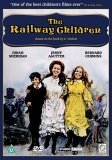 The Railway Children | DVD | (21/08/2006)
from £7.05
| Saving you £5.94 (84.26%)
| RRP
The Railway Children | DVD | (21/08/2006)
from £7.05
| Saving you £5.94 (84.26%)
| RRP Lionel Jeffries' beloved film version of ES Nesbit's THE RAILWAY CHILDREN stars Jenny Agutter and Bernard Cribbins in a tale that has inspired kids and parents alike since its release in 1970.
 Man About The House - Series 1 | DVD | (08/04/2002)
from £8.95
| Saving you £4.04 (31.10%)
| RRP
Man About The House - Series 1 | DVD | (08/04/2002)
from £8.95
| Saving you £4.04 (31.10%)
| RRP One of Thames TV's most successful sitcoms about the ups and downs of mixed flat-sharing. Three's A Crowd: Chrissy and Jo throw a farewell party for their flatmate who's getting engaged and moving out. Next morining they find Robin asleep in their bath. They're looking for a new flatmate and Robin is looking for somewhere to live so the girls ask Robin to stay. All they have to do then is to talk the Ropers into agreeing to the new arrangement... And Mother Makes Four: Chrissy's mother is about to pay a visit. She doesn't know Robin is living in the flat so he's told to make himself scarce. Then Chrissy's mother decides to stay the night... Some Enchanted Evening: Jo's new boyfriend is coming to the flat for a meal. Robin is persuaded to cook it. Then he and Chrissy have to spend the evening playing monopoly with the Ropers. They learn that Chrissy's boyfriend is Jewish - and Robin has cooked roast pork for their meal! And Then There Were Two: Chrissy is very nervous when Jo goes away for the weekend and leaves her alone in the flat with Robin. Robin brings another woman back only for Chrissy to sabotage his plans for a night of passion. It's Only Money: The rent is due and the money put aside to pay it has disappeared from the flat. Robin Chrissy and Jo have to find a way of getting some more money quickly... Match Of The Day: Robin has been picked to play in a college football match. A few days before the game he goes down with a bad cold. Chrissy and Jo rally round in an attempt to help him to recover in time to play. No CHildren No Dogs: Robin accidentally acquires a puppy. The lease on the flat says 'no pets' so Roper mustn't find out...
 Man About The House - Series 1 | DVD | (08/04/2013)
from £8.98
| Saving you £6.00 (85.84%)
| RRP
Man About The House - Series 1 | DVD | (08/04/2013)
from £8.98
| Saving you £6.00 (85.84%)
| RRP One of Thames TV's most successful sitcoms about the ups and downs of mixed flat-sharing. Three's A Crowd: Chrissy and Jo throw a farewell party for their flatmate who's getting engaged and moving out. Next morining they find Robin asleep in their bath. They're looking for a new flatmate and Robin is looking for somewhere to live so the girls ask Robin to stay. All they have to do then is to talk the Ropers into agreeing to the new arrangement... And Mother Makes Four:
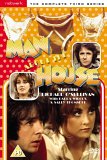 Man About The House - The Complete Third Series | DVD | (20/03/2006)
from £N/A
| Saving you £N/A (N/A%)
| RRP
Man About The House - The Complete Third Series | DVD | (20/03/2006)
from £N/A
| Saving you £N/A (N/A%)
| RRP The complete third series of one of Thames TV's most successful sitcoms about the ups and downs of mixed flat-sharing. Episodes comprise: 1. Cuckoo In The Nest 2. Come Into My Parlour 3. I Won't Dance Don't Ask Me 4. Of Mice And Women 5. We Shall Not Be Moved 6. Three Of A Kind
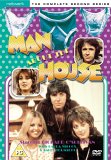 Man About The House - Series 2 | DVD | (30/01/2006)
from £N/A
| Saving you £N/A (N/A%)
| RRP
Man About The House - Series 2 | DVD | (30/01/2006)
from £N/A
| Saving you £N/A (N/A%)
| RRP When London bachelor girls Chrissy and Jo need a third girl to share their apartment they find the answer asleep in their bathtub. His name is Robin Tripp and though he's not a girl exactly he is studying to be a gourmet chef and who can tell the difference these days anyway? Landlord George Roper can for one and he's incensed. His wife Mildred can too and she's intrigued... So the question is will the good-cooking newcomer Robin Tripp fall on his face or feet - or wind up with e
![Man About The House [1974]](/pictures/1020147.jpg) Man About The House | DVD | (24/09/2001)
from £N/A
| Saving you £N/A (N/A%)
| RRP
Man About The House | DVD | (24/09/2001)
from £N/A
| Saving you £N/A (N/A%)
| RRP This is the film based on the 1970s TV sitcom Man About the House, made during the same period with the same cast. At the time, the whole idea of a single man and two single women sharing a flat, however (more-or-less) platonically, seemed terribly naughty. The scriptwriters wickedly stirred things up even further by making Richard O'Sullivan's character a randy-but-gentlemanly heterosexual, despite being a catering student--after all, in the 70s everyone just knew that all chefs were roaring poofs. The trio's sex-starved landlady (Yootha Joyce) and her rodent-like, impotent husband (Brian Murphy) were later to get their own series, George and Mildred. The plot is a perfunctory affair, as property developers attempt and fail to demolish the street in which the protagonists live. That said, the script (cowritten by John Mortimer) isn't really narrative-driven anyway, it's purely an excuse for the characters to interact with the will-they-won't-they-ooh-they-are-a-bit relationship between Robin and Chrissie (Paula Wilcox) and practically invites the viewer to cheer them on. While the transition to the big screen caused the idea to lose much of its energy, as a dollop of comedy nostalgia Man About the House is still great fun. And if you don't laugh at the jokes, just check out the clothes, cars, hairstyles and makeup, not to mention all that cigarette smoking! --Roger Thomas
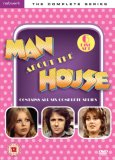 Man About the House - Complete Box Set | DVD | (24/09/2007)
from £N/A
| Saving you £N/A (N/A%)
| RRP
Man About the House - Complete Box Set | DVD | (24/09/2007)
from £N/A
| Saving you £N/A (N/A%)
| RRP Chrissy and Jo share a bedsit flat at 6 Myddleton Terrace in the Earls Court district of London. The morning after a farewell party for a third (female) flatmate and in sore need of the extra financial contribution they prepare to start looking for her replacement. Unbeknownst to them asleep in the bath after drinking too much of an appalling concoction they called punch is Robin Tripp the friend of a friend of a friend of a friend and a catering student to boot. Since he can co
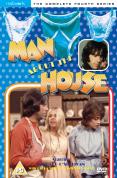 Man About The House - The Complete Fourth Series | DVD | (07/08/2006)
from £11.81
| Saving you £4.17 (47.28%)
| RRP
Man About The House - The Complete Fourth Series | DVD | (07/08/2006)
from £11.81
| Saving you £4.17 (47.28%)
| RRP The complete fourth series of one of Thames TV's most successful sitcoms about the ups and downs of mixed flat-sharing. Episodes comprise: 1. Home And Away 2. One For The Road 3. All In The Game 4. Never Give Your Real Name 5. The Tender Trap 6. My Son My Son
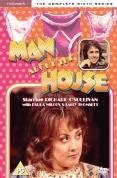 Man About The House - The Complete Sixth Series | DVD | (14/05/2007)
from £9.43
| Saving you £3.56 (27.40%)
| RRP
Man About The House - The Complete Sixth Series | DVD | (14/05/2007)
from £9.43
| Saving you £3.56 (27.40%)
| RRP The complete fifth series of one of Thames TV's most successful sitcoms about the ups and downs of mixed flat-sharing. Episodes Comprise: 1. The Party's Over 2. One More For The Pot 3. The Generation Game 4. The Sunshine Boys 5. Mum Always Liked You Best 6. Fire Down Below 7. Another Bride Another Groom
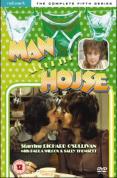 Man About The House - The Complete Fifth Series | DVD | (22/01/2007)
from £N/A
| Saving you £N/A (N/A%)
| RRP
Man About The House - The Complete Fifth Series | DVD | (22/01/2007)
from £N/A
| Saving you £N/A (N/A%)
| RRP The complete fourth series of one of Thames TV's most successful sitcoms about the ups and downs of mixed flat-sharing. Episodes comprise: 1. The Last Picture Show 2. Right Said George 3. A Little Knowledge 4. Love And Let Love 5. How Does Your Garden Grow? 6. Come Fly With Me
![Straw Dogs [1971]](/pictures/1018838.jpg) Straw Dogs | DVD | (22/09/2003)
from £N/A
| Saving you £N/A (N/A%)
| RRP
Straw Dogs | DVD | (22/09/2003)
from £N/A
| Saving you £N/A (N/A%)
| RRP According to critic Pauline Kael Straw Dogs was "the first American film that is a fascist work of art". Sam Peckinpah's only film shot in Britain is adapted from a novel by Gordon M Williams called The Siege of Trencher's Farm which Peckinpah described as a "lousy book with one good action-adventure sequence". The setting is Cornwall, where mild-mannered US academic David Sumner (Dustin Hoffman) has bought a house with his young English wife Amy (Susan George) in the village where she grew up. David is mocked by the locals (one of whom is Amy's ex-boyfriend) and treated with growing contempt by his frustrated wife, but when his house comes under violent siege he finds unexpected reserves of resourcefulness and aggression. The movie, Peckinpah noted, was much influenced by Robert Ardrey's macho-anthropological tract, The Territorial Imperative. Its take on Cornish village life is fairly bizarre--this is a Western in all but name--and many critics balked at the transposition of Peckinpah's trademark blood-and-guts to the supposed peace of the British countryside. A scene where Amy is raped caused particular outrage, not least since it's hinted she consents to it. Not for the first time in Peckinpah's movies there are disquieting elements of misogyny, and it doesn't help that the chemistry between Hoffman and George is non-existent. (Impossible to believe these two would ever have clicked, let alone married.) But taken as a vision of irrational violence irrupting into a civilised way of life Straw Dogs is powerful and unsettling, and the action sequences are executed with all Peckinpah's unfailing flair and venom. Oh, and that title? A quote from Chinese sage Lao-Tze, it seems, "The wise man is ruthless and treats the people as straw dogs." The film was long withheld from home viewing in Britain by nervous censors, but this release presents it complete and uncut. --Philip KempOn the DVD: Straw Dogs is as jam-packed a disc as is possible for a film made before the days of obligatory "making of" features. Both the sound and visuals have transferred well, and, like the script, have aged well. There's a bumbling original interview in the style of Harry Enfield's Mr. Cholmondley-Warner, along with stills and original trailers. The new material includes a feature on the history of the film's censorship and commentaries by Peckinpah's biographers musing over interesting fan-facts (though none of the speakers have any first-hand experience of the making of the film). However, Katy Haber's commentary, and interviews with Susan George and Dan Melnick, offer a much more in-depth and intimate portrayal of the man and the making of the film. --Nikki Disney
![The Railway Children [DVD] [2020]](/pictures/1151666.jpg) The Railway Children | DVD | (06/04/2020)
from £7.99
| Saving you £N/A (N/A%)
| RRP
The Railway Children | DVD | (06/04/2020)
from £7.99
| Saving you £N/A (N/A%)
| RRP Starring Jenny Agutter and Bernard Cribbins, Lionel Jeffries' adaptation of E. Nesbit's much-loved bestseller, The Railway Children is a timeless and enduring affair. After their father is mysteriously taken away, three Edwardian children move to the country where the local railway becomes a source of hope and adventure. Sensitive without being sentimental, the film perfectly captures a magical moment in childhood, and is widely regarded as one of the greatest children's films of all time. Extras: Now and Then; a retrospective documentary on The Railway Children Interview with acclaimed children's author Jacqueline Wilson Interview with Jenny Agutter Interview with Bernard Cribbins Interview with Sally Thomsett

Please wait. Loading...
This site uses cookies.
More details in our privacy policy